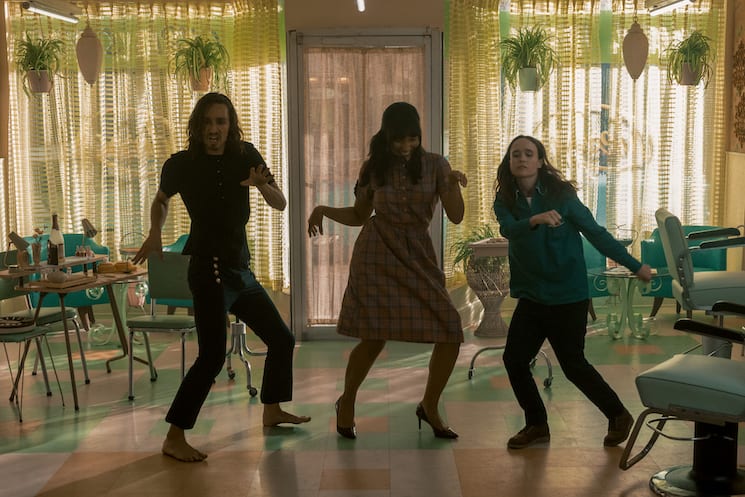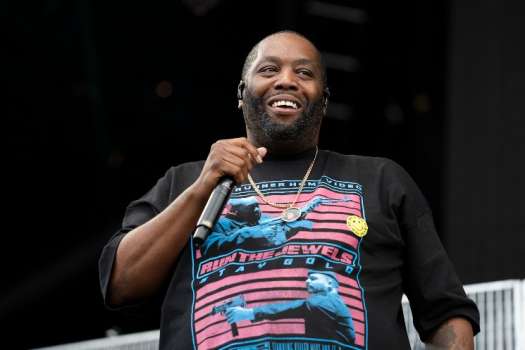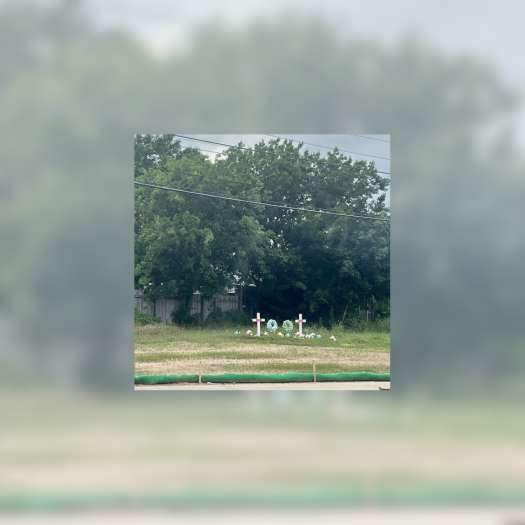At the start of season 2 of Netflix's The Umbrella Academy, it's clear that not a whole lot has changed. After skipping back in time during the season 1 finale to stave off their last run-in with Doomsday, it's business as usual for the Hargreeves clan who now find themselves scattered through time and space across various iterations of 1960s Dallas.
Vanya (Ellen Page) has lost her memory and her newfound psychic powers along with it. Luther (Tom Hopper) is looking for purpose in all the wrong places, and Diego (David Castañeda) has gotten himself admitted after trying to stop JFK's assassination. Allison (Emmy Raver-Lampman) has found her voice, along with a place in the burgeoning civil rights movement. Meanwhile, Klaus (Robert Sheehan) has gathered a following as a Dionysian 'Swinging Sixties' cult leader for an "alternative spiritual community," leaving his deceased brother and spectral sentinel Ben (Justin H. Min) with no choice but to tag along reluctantly. However, when Five (Aidan Gallagher) arrives in the dystopian nuclear hellscape of an accelerated Cold War, he sets about reuniting his siblings to restore the timeline and stop the end of the world (again). As the first episode wraps up, Five successfully tracks down Luther, who's moonlighting as a mob boss bodyguard, and begs for his help — a request to which Luther responds with a perfunctory "I don't give a shit."
Much like Season 1, creator and showrunner Steve Blackman (Fargo, Altered Carbon) continues to push this live-action adaptation along the same narrative trajectory as the comic book series written by My Chemical Romance frontman Gerard Way and illustrated by Gabriel Bá. Along with the predictable Hargreeves family hijinks, the second season of The Umbrella Academy quickly thrusts the audience deep into a fantastical world of shadowy crime drama and sci-fi shenanigans. Across ten episodes, the show makes good use of its new Texan setting to jump between ruthless Swedish assassins masquerading as milk delivery men, oppressed minorities and police brutality, deep state conspiracy theories, frustrated housewives yearning to escape suburban cultural norms, slimy gangsters, and a new corporate continuum overlord in the form of a cigarette-smoking goldfish.
Most of the season is spent with our main cast of adoptive siblings, as they settle into their new timeline circumstances and the rude awakening provided by yet another family reunion. Some, like Allison and Vanya, have attempted to play house with mixed results, while others, like Klaus and Luther, found solace in isolation. When the gang is back together again, unresolved tensions rear their head once more, forcing the group into a high-stakes game of cooperation and self-sacrifice. Elsewhere, temporal excursions into the past allow the show to flesh out the backstory of supporting characters, while also introducing new players like Lila (Ritu Arya), Raymond (Yusuf Gatewood) and Sissy (Marin Ireland).
We learn more about Sir Reginald Hargreeves (Colm Feore), the billionaire industrialist and Umbrella Academy's adoptive father, including the origins of his simian companion Pogo and the inspiration for the android Grace (Jordan Claire Robbins). Additionally, the motivations of The Handler (Kate Walsh) and the nefarious Commission get some much-needed screen time, adding clarity and purpose to an already over-stuffed narrative.
While the beating heart of The Umbrella Academy remains primarily rooted in the vicissitudes of interpersonal conflict, season 2 manages to dress up these private explorations with bursts of mind-bending action sequences, crackling dialogue, gratuitous gore effects and a truly killer soundtrack. Memorable moments include a collage of armed struggle, psychic rage, and time-travel paradoxes set to "Everybody (Backstreet's Back)." Another honourable mention occurs when Vanya endures a drugged FBI interrogation that quickly descends into a phantasmagorical episode synced to the Butthole Surfers' "Pepper." Suffice to say, those looking for traditional superhero arcs with linear storytelling, sharp moral clarity and neat resolution will likely be rubbed the wrong way.
Overall, the result is another entry in the ambitious and overtly stylistic superhero romp, one that leans heavily on familial dysfunction and triumphs over personal trauma, rather than cliché masked avenger tropes. And while the series certainly has its fair share of critical issues — uneven tone, messy timeline, off-the-wall character eccentricities — these are the very things that make for a compelling narrative ride.
(Netflix)Vanya (Ellen Page) has lost her memory and her newfound psychic powers along with it. Luther (Tom Hopper) is looking for purpose in all the wrong places, and Diego (David Castañeda) has gotten himself admitted after trying to stop JFK's assassination. Allison (Emmy Raver-Lampman) has found her voice, along with a place in the burgeoning civil rights movement. Meanwhile, Klaus (Robert Sheehan) has gathered a following as a Dionysian 'Swinging Sixties' cult leader for an "alternative spiritual community," leaving his deceased brother and spectral sentinel Ben (Justin H. Min) with no choice but to tag along reluctantly. However, when Five (Aidan Gallagher) arrives in the dystopian nuclear hellscape of an accelerated Cold War, he sets about reuniting his siblings to restore the timeline and stop the end of the world (again). As the first episode wraps up, Five successfully tracks down Luther, who's moonlighting as a mob boss bodyguard, and begs for his help — a request to which Luther responds with a perfunctory "I don't give a shit."
Much like Season 1, creator and showrunner Steve Blackman (Fargo, Altered Carbon) continues to push this live-action adaptation along the same narrative trajectory as the comic book series written by My Chemical Romance frontman Gerard Way and illustrated by Gabriel Bá. Along with the predictable Hargreeves family hijinks, the second season of The Umbrella Academy quickly thrusts the audience deep into a fantastical world of shadowy crime drama and sci-fi shenanigans. Across ten episodes, the show makes good use of its new Texan setting to jump between ruthless Swedish assassins masquerading as milk delivery men, oppressed minorities and police brutality, deep state conspiracy theories, frustrated housewives yearning to escape suburban cultural norms, slimy gangsters, and a new corporate continuum overlord in the form of a cigarette-smoking goldfish.
Most of the season is spent with our main cast of adoptive siblings, as they settle into their new timeline circumstances and the rude awakening provided by yet another family reunion. Some, like Allison and Vanya, have attempted to play house with mixed results, while others, like Klaus and Luther, found solace in isolation. When the gang is back together again, unresolved tensions rear their head once more, forcing the group into a high-stakes game of cooperation and self-sacrifice. Elsewhere, temporal excursions into the past allow the show to flesh out the backstory of supporting characters, while also introducing new players like Lila (Ritu Arya), Raymond (Yusuf Gatewood) and Sissy (Marin Ireland).
We learn more about Sir Reginald Hargreeves (Colm Feore), the billionaire industrialist and Umbrella Academy's adoptive father, including the origins of his simian companion Pogo and the inspiration for the android Grace (Jordan Claire Robbins). Additionally, the motivations of The Handler (Kate Walsh) and the nefarious Commission get some much-needed screen time, adding clarity and purpose to an already over-stuffed narrative.
While the beating heart of The Umbrella Academy remains primarily rooted in the vicissitudes of interpersonal conflict, season 2 manages to dress up these private explorations with bursts of mind-bending action sequences, crackling dialogue, gratuitous gore effects and a truly killer soundtrack. Memorable moments include a collage of armed struggle, psychic rage, and time-travel paradoxes set to "Everybody (Backstreet's Back)." Another honourable mention occurs when Vanya endures a drugged FBI interrogation that quickly descends into a phantasmagorical episode synced to the Butthole Surfers' "Pepper." Suffice to say, those looking for traditional superhero arcs with linear storytelling, sharp moral clarity and neat resolution will likely be rubbed the wrong way.
Overall, the result is another entry in the ambitious and overtly stylistic superhero romp, one that leans heavily on familial dysfunction and triumphs over personal trauma, rather than cliché masked avenger tropes. And while the series certainly has its fair share of critical issues — uneven tone, messy timeline, off-the-wall character eccentricities — these are the very things that make for a compelling narrative ride.




